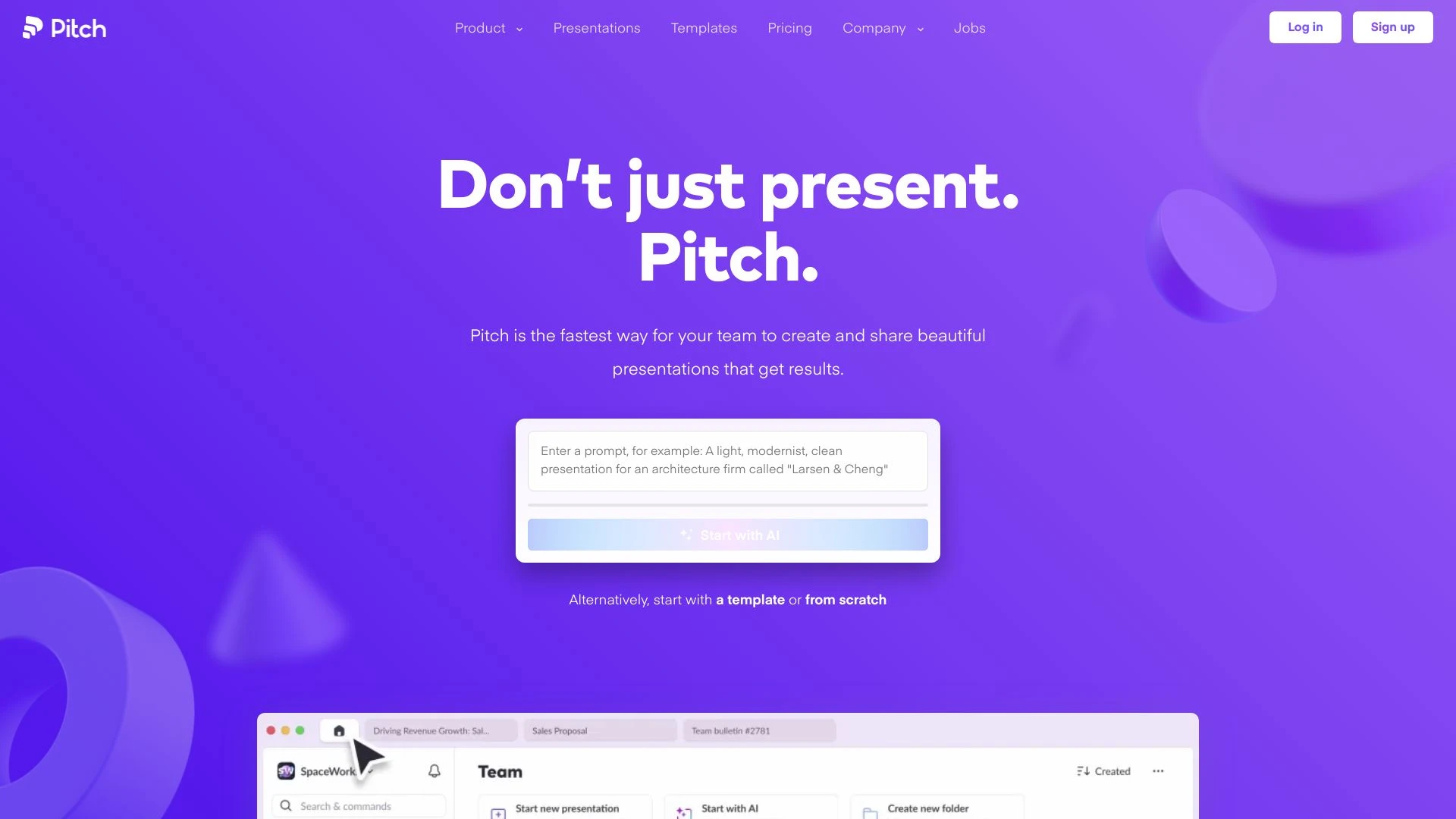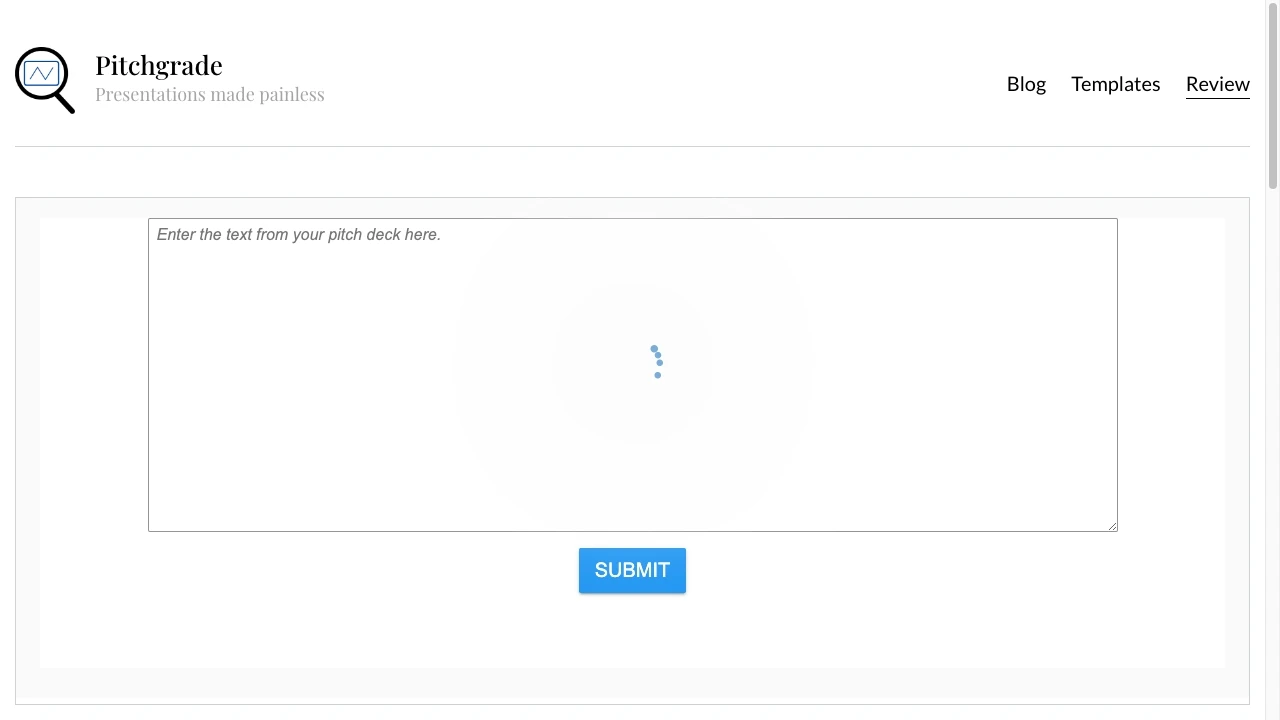Pitch versus PitchGrade
Pitch y PitchGrade son plataformas diseñadas para ayudar a los profesionales a crear y presentar pitches. Pitch se centra en la colaboración y presentaciones visualmente atractivas, dirigido a startups y equipos de ventas. Lanzado en 2021, ofrece herramientas de diseño y analítica. PitchGrade, sin embargo, enfatiza la retroalimentación y revisión, atendiendo a emprendedores que buscan mejorar los pitches, lanzado en 2020.


Pitch
Ideal Para
creando presentaciones comerciales
desarrollando presentaciones de ventas
facilitando reuniones de equipo
preparando informes para la junta
Fortalezas Clave
mejora la colaboración
ahorra tiempo en la creación de presentaciones
opciones de personalización flexibles
Características Principales
borradores generados por IA
plantillas de diapositivas personalizables
herramientas de edición inteligentes
colaboración en tiempo real
opciones de compartición fáciles
PitchGrade
Ideal Para
Desarrollar presentaciones para inversores
Presentar nuevas ideas de productos
Elaborar propuestas de venta
Entregar presentaciones de campañas de marketing
Fortalezas Clave
Genera presentaciones rápidamente
Disponible en múltiples idiomas
Retroalimentación personalizada para mejorar la calidad
Características Principales
Generación de diapositivas instantánea
Soporte para más de 180 idiomas
Herramienta de revisión de IA para comentarios
Plantillas personalizables
Selección de modo rápido para diferentes tipos de presentaciones
Popularidad
Matriz de Decisión
| Factor | Pitch | PitchGrade |
|---|---|---|
| Ease of Use |
|
|
| Features |
|
|
| Value for Money |
|
|
| Interface Design |
|
|
| Learning Curve |
|
|
| Customization Options |
|
|
Guía de Decisión Rápida
- Tú quieres presentaciones visuales impresionantes sin esfuerzo
- Tú apuntas a una colaboración en equipo sin interrupciones en tiempo real
- Tú valoras plantillas personalizables que se ajusten a tu marca.
- Buscas herramientas de retroalimentación integradas para la mejora.
- Tú quieres compartir y presentar en línea fácilmente.
- Tú quieres retroalimentación imparcial sobre la calidad de tu presentación
- Tú apuntas a refinar tus habilidades de presentación de manera efectiva
- Tú valoras los conocimientos basados en datos para la preparación de inversores
- Buscas una interfaz amigable y acceso rápido
- Tú buscas aumentar tu confianza en escenarios de presentación
Lo Que Dicen Nuestros Expertos
Pitch sobresale en presentaciones colaborativas, ofreciendo características de diseño intuitivas y edición en tiempo real, lo que lo hace ideal para equipos que necesitan maquetas rápidas y visualmente atractivas. En contraste, PitchGrade se especializa en comentarios detallados y puntuaciones de pitch, perfecto para startups que buscan información de inversores. Los desafíos de implementación para Pitch pueden incluir la curva de aprendizaje para las herramientas de diseño, mientras que PitchGrade podría enfrentar obstáculos para integrar bucles de retroalimentación de manera eficiente. Elige según tus necesidades específicas de presentación.
Jamie Davis
Analista de Software
A primera vista
Pitch ofrece una robusta plataforma colaborativa con herramientas para la creación de presentaciones en equipo, ideal para empresas y startups. En contraste, PitchGrade se centra en proporcionar sistemas de evaluación y retroalimentación para presentaciones, lo que lo hace adecuado para educadores y estudiantes. Las ventajas de Pitch incluyen versatilidad y opciones de diseño; las desventajas implican una curva de aprendizaje más pronunciada. Las ventajas de PitchGrade son su facilidad de uso y retroalimentación dirigida; su desventaja es la personalización limitada. Elige Pitch para la colaboración y PitchGrade para contextos educativos.
Planes de Precios y Suscripción
Pitch ofrece un nivel gratuito con funciones limitadas mientras que sus planes de pago comienzan en 24 dólares al mes por usuario para herramientas más completas. PitchGrade ofrece un servicio básico gratuito con planes premium que comienzan en 15 dólares al mes por usuario. Para pequeñas empresas PitchGrade puede ofrecer mejor rentabilidad mientras que equipos más grandes podrían beneficiarse de las robustas características de Pitch. En general ambas plataformas atienden a diferentes tamaños de negocio con opciones de precios escalables.
Métricas de Rendimiento
Pitch ofrece métricas de rendimiento más rápidas con una tasa de velocidad más alta lo que lo hace ideal para escenarios en tiempo real. En contraste PitchGrade sobresale en precisión proporcionando análisis detallados que destacan en evaluaciones complejas. Ambas herramientas son fiables sin embargo Pitch es preferible para tareas que exigen rapidez mientras que PitchGrade supera en contextos impulsados por la precisión.
Experiencia de Usuario
Pitch ofrece una interfaz elegante y moderna con navegación intuitiva, lo que la hace fácil de usar para todos los niveles de habilidad. Su personalización es robusta, lo que permite a los usuarios adaptar su experiencia. PitchGrade, aunque funcional, es más simple en diseño, con una curva de aprendizaje más pronunciada debido a menos opciones de personalización. Los recursos de soporte al usuario para Pitch incluyen guías detalladas y foros comunitarios, mientras que el soporte de PitchGrade es limitado, lo que afecta la experiencia general del usuario.
Integraciones y Compatibilidad
Pitch ofrece integraciones robustas con herramientas como Slack Google Drive y Notion mejorando la colaboración PitchGrade mientras que se centra más en la calificación y retroalimentación se integra con plataformas como Trello y Asana Ambos admiten formatos populares asegurando compatibilidad en los flujos de trabajo
Limitaciones y Desventajas
Las limitaciones de Pitch incluyen una curva de aprendizaje empinada y opciones de plantillas limitadas, mientras que PitchGrade sufre de problemas de interfaz de usuario y tiempos de respuesta más lentos. Las soluciones incluyen utilizar plantillas externas para Pitch y mejorar PitchGrade con extensiones de navegador para velocidad.